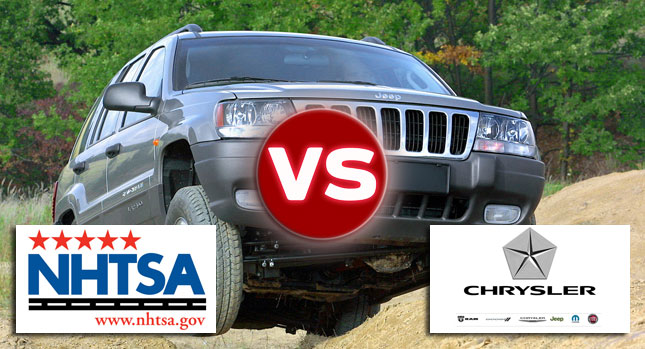Most of the times, the National Highway Traffic Safety Administration (NHTSA) and automakers work together and agree upon a recall when there’s a problem or at least the potential for an issue with a car, but it isn’t always like this.
Recently, the NHTSA issued a recommendation for the recall of around 2.7 million Jeep SUVs, including the 1993-2004 model-year Grand Cherokee and 2002-2007 Liberty, after assessing that the fuel tanks in these models pose an unreasonable risk to motor vehicle safety in rear-impact collisions.
“NHTSA’s assessment of the data collected during Preliminary Evaluation (PE) 10-031 indicates that rear-impact-related tank failures and vehicle fires are more prevalent in the JGC than in the non-Jeep peer vehicles,” said the safety agency in a filing on its website. “In addition, the agency’s analysis of its FARS data for the peer vehicles and three Jeep models shows a higher incidence of rear-impact, fatal fire crashes for the Jeep products.
NHTSA may have requested a recall for these two Jeep models, but the Chrysler Group does not agree and has rejected the action. The Detroit carmaker issued the following press statement today:
Chrysler Group LLC Responds to NHTSA Recall Letter
“NHTSA (National Highway Traffic Safety Administration) has issued a recall request letter proposing that Chrysler Group recall the Jeep Grand Cherokee in model years 1993 to 2004 and the Jeep Liberty in model years 2002 to 2007 (a total of approximately 2.7 million vehicles).
Chrysler Group has been working and sharing data with the Agency on this issue since September 2010. The company does not agree with NHTSA’s conclusions and does not intend to recall the vehicles cited in the investigation. The subject vehicles are safe and are not defective.
We believe NHTSA’s initial conclusions are based on an incomplete analysis of the underlying data, and we are committed to continue working with the Agency to resolve this disagreement. “The safety of drivers and passengers has long been the first priority for Chrysler brands and that commitment remains steadfast,” said Sergio Marchionne, Chairman and CEO of Chrysler Group LLC.
“The company stands behind the quality of its vehicles. All of us remain committed to continue working with NHTSA to provide information confirming the safety of these vehicles.”
Chrysler Group’s position on this matter is clear.
These vehicles met and exceeded all applicable requirements of the Federal Motor Vehicle Safety Standards, including FMVSS 301, pertaining to fuel-system integrity. Our analysis shows the incidents, which are the focus of this request, occur less than once for every million years of vehicle operation. This rate is similar to comparable vehicles produced and sold during the time in question.
Chrysler Group stands behind the quality and safety of its vehicles. It conducts voluntary recalls when they are warranted, and in most cases, before any notice or investigation request from NHTSA.”
The NHTSA has yet to respond to Chrysler’s press statement. So, who would you trust on this matter – the government agency or the Chrysler Group? Share your thoughts below.
PHOTO GALLERY













